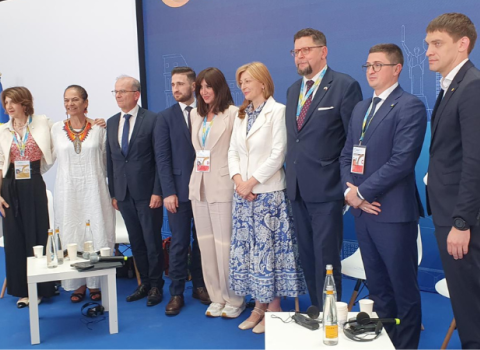
Fraunhofer's gleaming Munich HQ
One of Europe's biggest research organisations, Fraunhofer Gesellschaft
in Germany, is pushing to close its first venture fund to finance
spin-off companies from the institution.
Fraunhofer, a powerhouse of industrial research and inventor of the popular MP3
digital music format, is finalising terms with undisclosed investors on
a €20 million first tranche of the fund, which is targeted for a final
size of €50 million, according to Andreas Äpfelbacher, project manager
at Fraunhofer’s Munich-based Venture Group, responsible for spin-offs
and investments.
“We want to bring in know-how from the outside to help increase our companies’ chances of getting further funding and to create closer contacts with industry,” said Äpfelbacher.
Fraunhofer joins the ranks of other elite European research bodies in seeking to reap the financial benefits — for both themselves and their employees — of their research.
Many British universities now have seed funds. Imperial College London this year went one step further by setting up its technology transfer office as a separate company for investment. In Sweden, the medical university Karolinska Institutet recently closed a second fund to invest in its spin-offs.
Anatomy of a funding giant
Fraunhofer — best known for the invention of the MP3 digital music
format — has some 12,500 people working at 80 research units, which
includes 58 separate research institutes spread across more than 40
locations in Germany.
It has an annual research budget of over €1 billion, most of which
comes from industry and publicly financed institutions looking for
contract research. The remaining amount, contributed by federal and
state governments, goes toward fundamental research.
In 2004, Fraunhofer got more than €25 million in revenues from licensing its own technologies to outside organizations. It covers a wide range of fields, such as digital media technology, molecular biology and ecology and laser technology, just to name a few.
But for a German institution to try it is unusual. Another big German research organisation, the Max Planck Society, focuses more on fundamental research, making it somewhat less appropriate for the fund structure, although it does have a spin-off program. And German universities are legally hampered from using their funds for a purpose not directly linked to their academic budget, which means they have to set up a third party entity to do so. “I think German universities are still far away from this,” says Götz Hoyer, partner with FHP private equity consultants in Munich.
Fraunhofer already has an active spin-off program, under which it has spawned some 80 companies over the past five years. The society has invested in about half of these startups, says Äpfelbacher, although he could not estimate the total investment. Fraaunhofer’s eight-person venture group coaches the companies and negotiates the level of financing from the research body. Currently it takes stakes valued at between €10,000 to €1 million in the companies in exchange for allowing them to license the technologies they have developed while under the Fraunhofer roof. The terms of each deal are negotiated on an individual basis.
Until now, Fraunhofer’s spin-offs were often launched at too early a stage to get follow-on funding, notes FHP’s Hoyer. Provided the fund closes as Fraunhofer expects – and in any financing, last-minute problems can arise - “this should allow them the financial means to do more,” he says.
The idea of creating a spin-off fund at the research body has been on the table since the Venture Group’s founding in 2000. But while enthusiasm was high during the boom times, interest waned after the market turned. Several different financial institutions were lined up at different times, but then withdrew, leaving the project on ice. “We were hit hard by the collapse of the Neuer Markt,” says Äpfelbacher.
The fund will be managed by Munich Venture Partners, a Munich-based VC whose partners are Walter Grassl, formerly with Carmel Ventures, Söhnke Mehrgardt, former chief technology officer at chip manufacturer Infineon, and Rolf Nagel, formerly of Star Ventures. Grassl declined to give further details of the cooperation between MVP and Fraunhofer ahead of the fund’s official closing.
Fraunhofer itself will invest an undisclosed amount in the fund, which will focus on investments in information technology, communications technology (components and semiconductors) and energy-related technology.





 A unique international forum for public research organisations and companies to connect their external engagement with strategic interests around their R&D system.
A unique international forum for public research organisations and companies to connect their external engagement with strategic interests around their R&D system.